高中英语复习北师大版《倒装句》课件(共33张PPT)
文档属性
| 名称 | 高中英语复习北师大版《倒装句》课件(共33张PPT) |  | |
| 格式 | zip | ||
| 文件大小 | 22.4KB | ||
| 资源类型 | 教案 | ||
| 版本资源 | 北师大版 | ||
| 科目 | 英语 | ||
| 更新时间 | 2018-11-26 19:22:55 | ||
图片预览


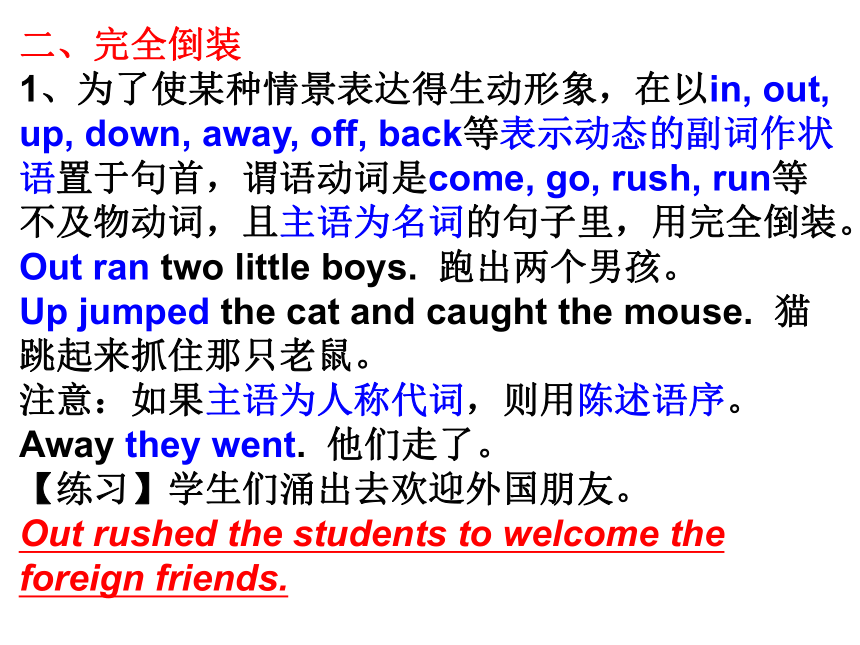

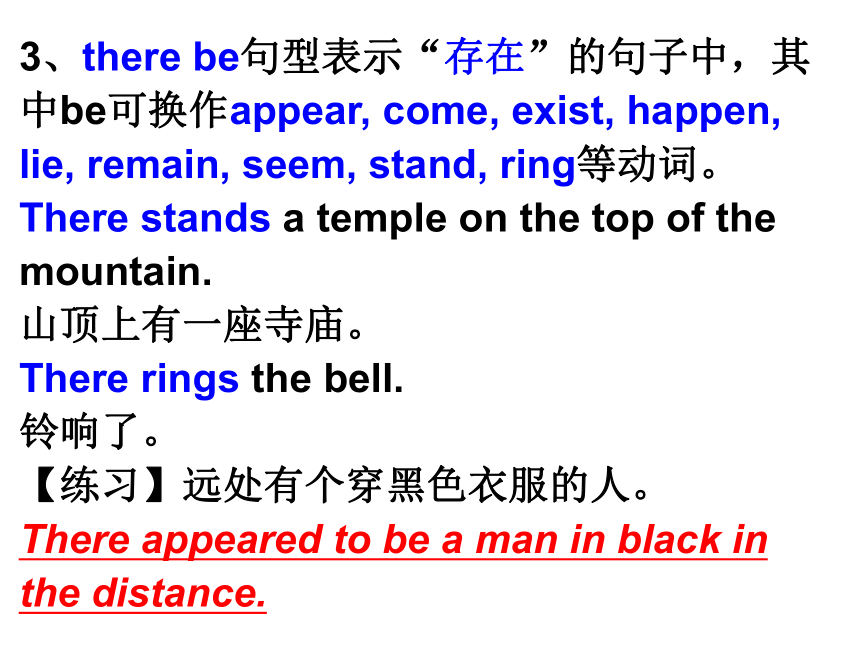
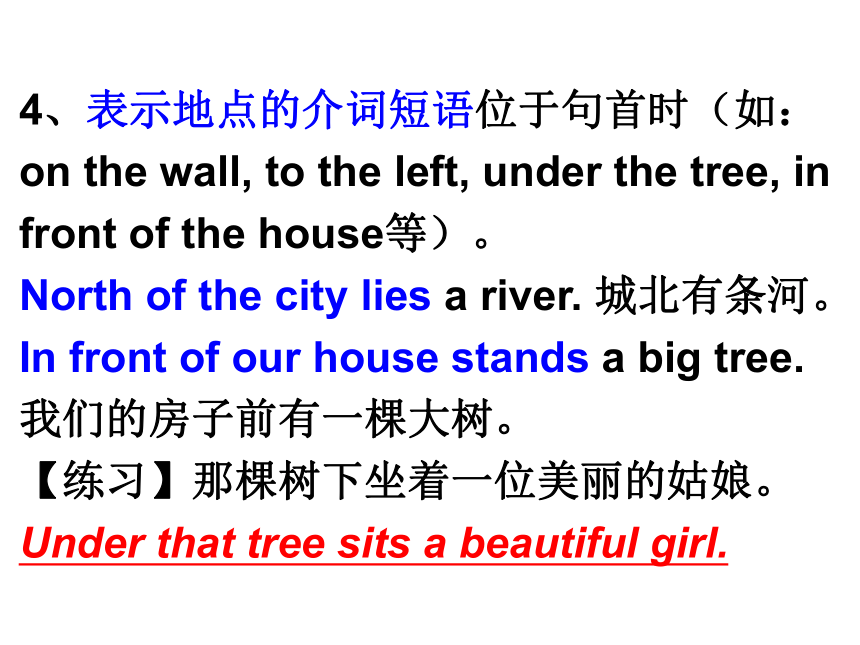
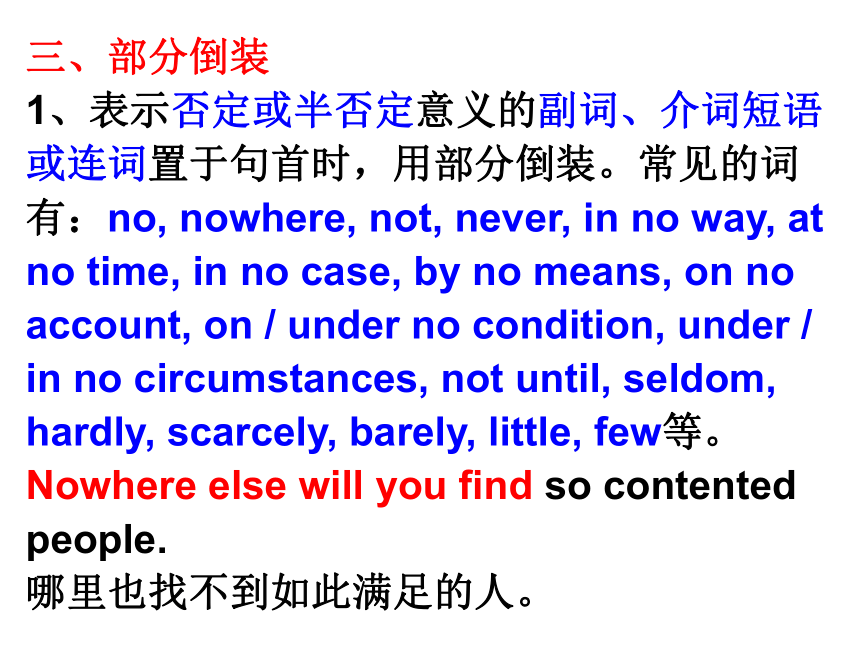
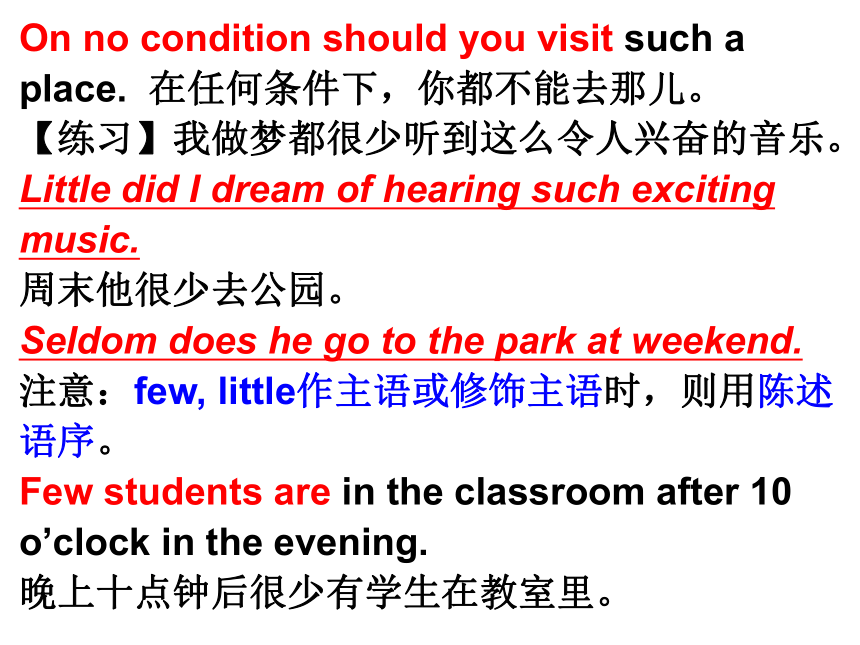
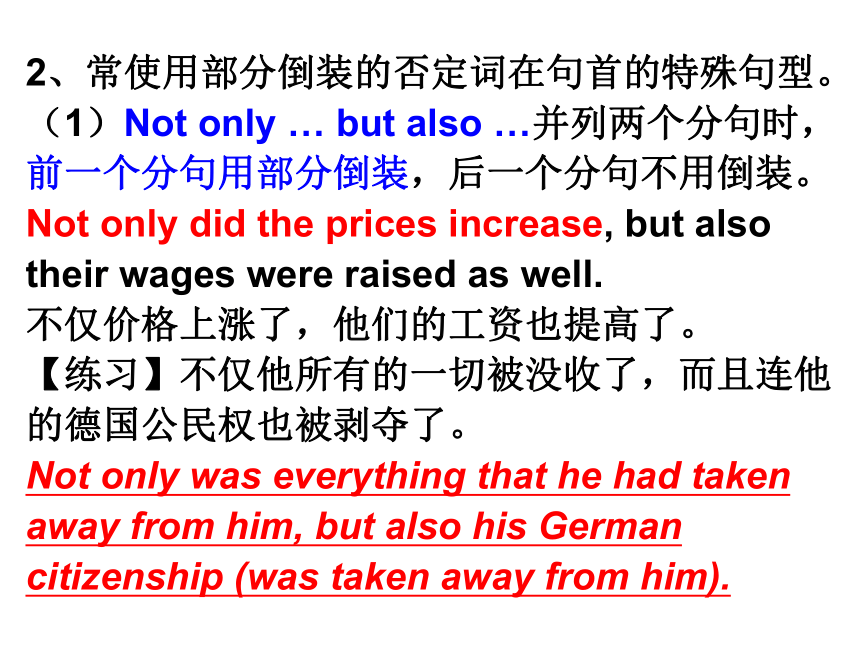
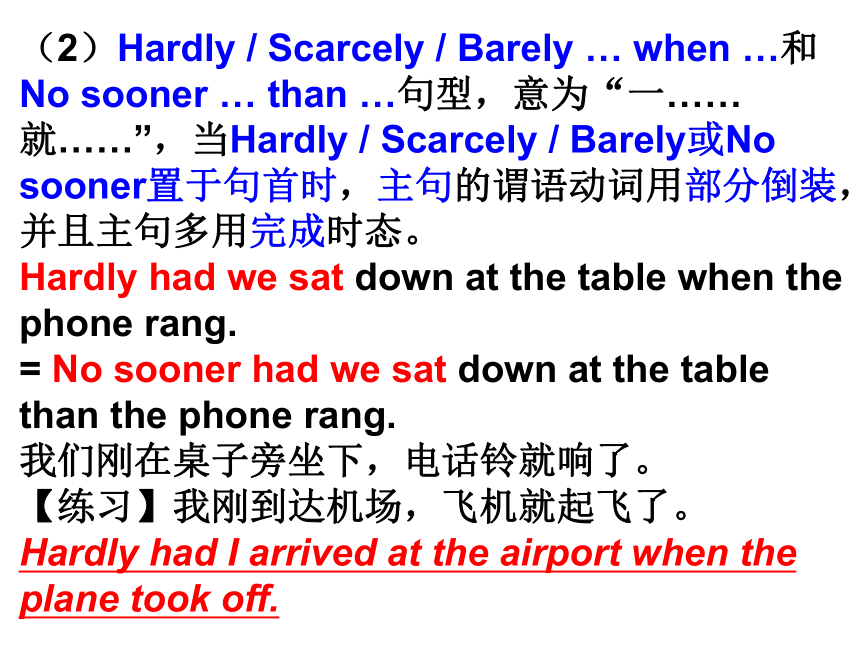
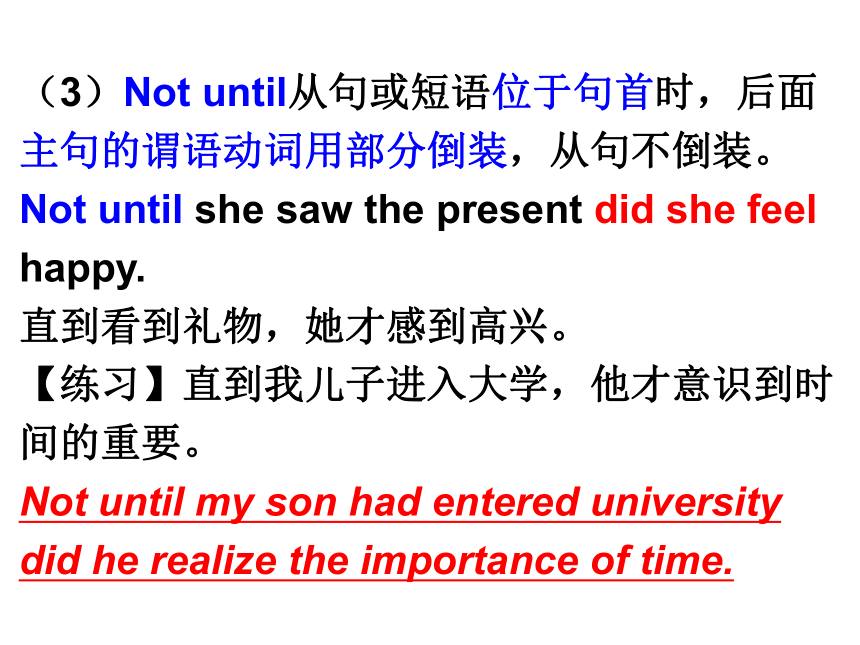
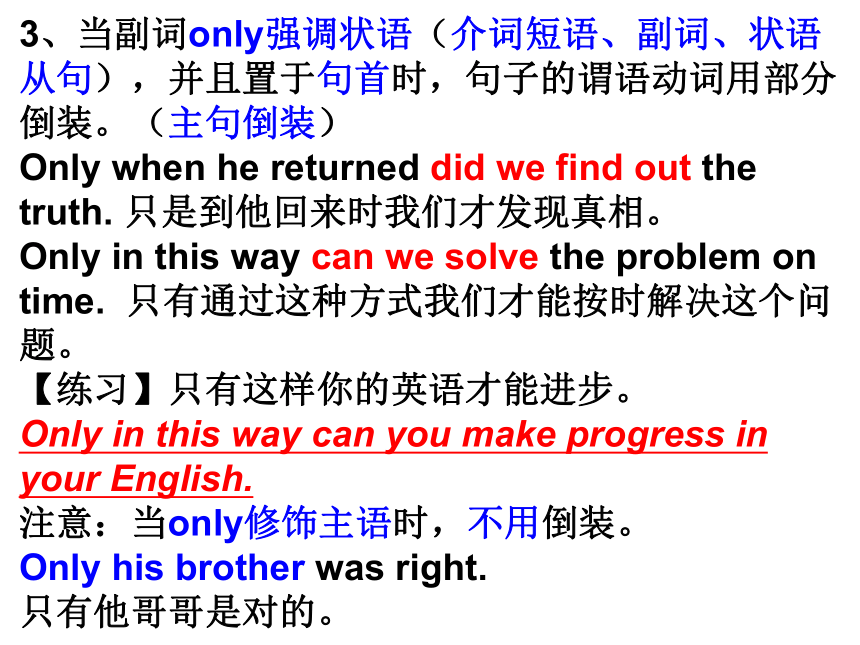
文档简介
课件33张PPT。倒装句一、概述:倒装句分为完全倒装(全部倒装)和部分倒装。谓语全部置于主语之前为完全倒装(是整个谓语动词,而非助动词),谓语的一部分(如助动词或情态动词)置于主语之前为部分倒装。二、完全倒装
1、为了使某种情景表达得生动形象,在以in, out, up, down, away, off, back等表示动态的副词作状语置于句首,谓语动词是come, go, rush, run等不及物动词,且主语为名词的句子里,用完全倒装。
Out ran two little boys. 跑出两个男孩。
Up jumped the cat and caught the mouse. 猫跳起来抓住那只老鼠。
注意:如果主语为人称代词,则用陈述语序。
Away they went. 他们走了。
【练习】学生们涌出去欢迎外国朋友。
Out rushed the students to welcome the foreign friends.2、句首为there, here, now, then等副词的句子,谓语动词是be, come, follow, go, begin等,且主语是名词时。
There goes the last bus. 末班车开走了。
Here are some picture books. 这是一些图画书。
注意:主语为代词时,则用陈述语序。
There he comes. 他来了。
【练习】邮递员来了。
Here comes the postman.3、there be句型表示“存在”的句子中,其中be可换作appear, come, exist, happen, lie, remain, seem, stand, ring等动词。
There stands a temple on the top of the mountain.
山顶上有一座寺庙。
There rings the bell.
铃响了。
【练习】远处有个穿黑色衣服的人。
There appeared to be a man in black in the distance. 4、表示地点的介词短语位于句首时(如:on the wall, to the left, under the tree, in front of the house等)。
North of the city lies a river. 城北有条河。
In front of our house stands a big tree. 我们的房子前有一棵大树。
【练习】那棵树下坐着一位美丽的姑娘。
Under that tree sits a beautiful girl.三、部分倒装
1、表示否定或半否定意义的副词、介词短语或连词置于句首时,用部分倒装。常见的词有:no, nowhere, not, never, in no way, at no time, in no case, by no means, on no account, on / under no condition, under / in no circumstances, not until, seldom, hardly, scarcely, barely, little, few等。
Nowhere else will you find so contented people.
哪里也找不到如此满足的人。On no condition should you visit such a place. 在任何条件下,你都不能去那儿。
【练习】我做梦都很少听到这么令人兴奋的音乐。
Little did I dream of hearing such exciting music.
周末他很少去公园。
Seldom does he go to the park at weekend. 注意:few, little作主语或修饰主语时,则用陈述语序。
Few students are in the classroom after 10 o’clock in the evening.
晚上十点钟后很少有学生在教室里。 2、常使用部分倒装的否定词在句首的特殊句型。
(1)Not only … but also …并列两个分句时,前一个分句用部分倒装,后一个分句不用倒装。
Not only did the prices increase, but also their wages were raised as well.
不仅价格上涨了,他们的工资也提高了。
【练习】不仅他所有的一切被没收了,而且连他的德国公民权也被剥夺了。
Not only was everything that he had taken away from him, but also his German citizenship (was taken away from him).(2)Hardly / Scarcely / Barely … when …和No sooner … than …句型,意为“一……就……”,当Hardly / Scarcely / Barely或No sooner置于句首时,主句的谓语动词用部分倒装,并且主句多用完成时态。
Hardly had we sat down at the table when the phone rang.
= No sooner had we sat down at the table than the phone rang.
我们刚在桌子旁坐下,电话铃就响了。
【练习】我刚到达机场,飞机就起飞了。
Hardly had I arrived at the airport when the plane took off.(3)Not until从句或短语位于句首时,后面主句的谓语动词用部分倒装,从句不倒装。
Not until she saw the present did she feel happy.
直到看到礼物,她才感到高兴。
【练习】直到我儿子进入大学,他才意识到时间的重要。
Not until my son had entered university did he realize the importance of time. 3、当副词only强调状语(介词短语、副词、状语从句),并且置于句首时,句子的谓语动词用部分倒装。(主句倒装)
Only when he returned did we find out the truth. 只是到他回来时我们才发现真相。
Only in this way can we solve the problem on time. 只有通过这种方式我们才能按时解决这个问题。
【练习】只有这样你的英语才能进步。
Only in this way can you make progress in your English.
注意:当only修饰主语时,不用倒装。
Only his brother was right.
只有他哥哥是对的。 4、“so+形容词/副词+that”和“such+名词+that”的结果状语从句,意为“如此……以致于……”,当“so+形容词/副词”“such+名词”位于句首时,主句的谓语动词用部分倒装,从句不倒装。
So clearly does he speak English that he can always make himself understood.
他英语讲得非常清晰,总能让别人听懂。
【练习】她是如此美丽的姑娘,以致于许多小伙子都爱上了她。
So beautiful a girl / Such a beautiful girl is she that many young boys fall in love with her.5、so / neither / nor置于句首,表示前面的情况也适用于后者,其句型为:so / neither / nor + be / 助动词/情态动词+主语,so与前面的肯定句呼应;neither / nor与前面的否定句呼应。
After that we never saw her again, nor did we hear from her.
从那以后我们再也没有见过她,也没有收到她的信件。
I saw the film last week, so did she.
上周我看了这部电影,她也看了。Neither … nor …引导两个分句时,两个分句都用部分倒装。
Neither have I seen him recently, nor have I heard from him.
我最近既没见到他,也没收到他的来信。
【练习】他没有去过农村,他也不想去那里。
He hasn’t been to the countryside, neither does he want to go there.
注意:如果后一句只是单纯重复前句的内容,对其肯定或附和,此时翻译成“确实”,用陈述语序。
— John won the first prize in the contest.
约翰在比赛中获了一等奖。
— So he did. 确实如此。 6、省略if的虚拟条件句以had / were / should开头,从句用部分倒装。
Had he worked harder, he would have got through the exam.
要是他再努力点,他就通过了考试。
Were she my friend, I would ask her for help. 如果她是我朋友,我就会请她帮忙。
Should it rain tomorrow, we would have to put off the visit to the Yangpu Bridge.
如果明天下雨,我们就得推迟去杨浦大桥的参观活动。
【练习】他们要是在这儿,他们会帮助我们的。
Were they here, they would help us. 7、as引导的让步状语从句,通常把从句中的表语、状语或谓语动词的一部分置于句首,用部分倒装。如果表语是单数可数名词,其前不用冠词。
Child as he is, he knows a lot about history. 尽管他是个孩子,但他知道许多有关历史的东西。
Try as he might, he failed again. 尽管又试了一次,他仍然失败了。
【练习】尽管他穷,但他诚实。
Poor as he is, he is honest.8、在表示祝愿的句子中。
May you have a happy holiday!
祝你假期愉快!
9、在以often, well, many a time, now and again 等方式或频度副词(短语)开头的句子中,要用部分倒装结构。
Many a time has John given me good advice. 约翰多次给我提好的建议。
Often have we made that test. 我们经常进行那种测试。
【练习】这男孩多次一个人去游泳。
Many a time did the boy go swimming alone. 10、such置于句首时(such后的be动词应与其后真正的主语保持一致)。
Such is life! 人生就是这样!
Such were his words. 他就是这样说的。
【练习】阿尔伯特?曼因斯坦就是这样一个人,一个纯朴而又取得巨大成就的人。
Such was Albert Einstein, a simple man of great achievements.11、作表语的形容词、分词或介词短语置于句首时,此时倒装结构为“表语+连系动词+主语”。
Present at the meeting were some important figures. 出席会议的是一些重要人物。
Gone are the days when Chinese were burdened with three mountains.
中国人民肩负三座大山的日子一去不复返了。
Sitting in front of the house was a little girl. 一个小女孩坐在房子前面。Among the goods are Christmas trees, flowers, candles and toys.
这些商品里有圣诞树、鲜花、蜡烛及玩具等。
【练习】附近有两只他们来这个岛乘坐的独木船。
Nearby were two canoes in which they had come to the island. 四、巩固练习
(一)把下列句子改成倒装句。
1. You can find such a beautiful garden nowhere else.
Nowhere else can you find such a beautiful garden.
2. Mary never does reading in the morning.
Never does Mary do reading in the morning. 3. The tip that he gave me lay there on the table.
There lay the tip he gave me on the table.
/ There, on the table, lay the tip he gave me.
4. I know nothing about it; I don’t want to know about it, either.
I know nothing about it; nor do I want to.
5. He not only loves music, but also he is good at dancing.
Not only does he love music, but also he is good at dancing. (二)完成句子
1. Opposite our school is a café (是一家咖啡厅).
2. By no means shall I understand you (我会理解你).
3. Under no circumstances can the boy’s money be found (男孩的钱被找到).
4. May you succeed / be successful (成功)! 5. Often does he hear (他听到) her sing in her room.
6. Little did I need to (我不需要) talk about the importance of English study.
7. Not only was it difficult (它不仅难) to understand, but it was too long.
8. Only when the rain stopped did the match start again (比赛又开始了).
9. Only then did I realize (我意识到) what “revolution” meant.10. Many a time has he made (他犯) the same mistake.
11. My brother seldom does his homework in the morning. Neither / Nor does John (约翰也不).
12. Not until the early years of the 19th century did man know what heat is (人们知道什么是热).
13. On the top of the hill stands an old pine tree (耸立着一棵老松树).14. Girl as she was (虽然她是女孩), she was very brave.
15. In the glasses is some milk (有些牛奶).
16. Jane must leave now and so must you (你也是).
17. You shouldn’t overwork yourself. Neither / Nor should your boss (你的老板也是).
18. No sooner had he picked up the receiver (他刚拿起话筒) than the door bell rang. 19. On no account may soft drink be taken (带软饮料) into the reading room.
20. Never before has he landed on the moon (他在月球登陆).
21. Young as he is (虽然他年轻), he is the director of the company.
22. Had I known what kind of man he was (如果我知道他是怎样的一个人), I wouldn’t have lent him the money. 23. Seldom do we get together (我们聚在一起) these days.
24. Never has he volunteered (他志愿) to answer the teacher’s questions.
25. Hardly / Scarcely had I walked in (我刚走进来) when I was caught by a strong man.
26. Not only does he know the question (他不但知道问题) but he knows the answer as well. (三)用倒装句翻译下列句子:
1、桌上放着很多的书。(there)
There , on the desk, lay many books.
2、他难以忍受这么热的天。(hardly)
Hardly can / could he bear such hot weather.3、玛丽不仅歌唱得好,钢琴也弹得很出色。(not only…but also)
Not only does Mary sing beautifully, but also she plays the piano wonderfully.
4、只有努力你才可以期待有更好的学习成绩。(Only)
Only with hard work can you expect better results/grades in your study.
5、他一到家就打开了电视。(no sooner… than)
No sooner had he got home than he turned on the TV.
1、为了使某种情景表达得生动形象,在以in, out, up, down, away, off, back等表示动态的副词作状语置于句首,谓语动词是come, go, rush, run等不及物动词,且主语为名词的句子里,用完全倒装。
Out ran two little boys. 跑出两个男孩。
Up jumped the cat and caught the mouse. 猫跳起来抓住那只老鼠。
注意:如果主语为人称代词,则用陈述语序。
Away they went. 他们走了。
【练习】学生们涌出去欢迎外国朋友。
Out rushed the students to welcome the foreign friends.2、句首为there, here, now, then等副词的句子,谓语动词是be, come, follow, go, begin等,且主语是名词时。
There goes the last bus. 末班车开走了。
Here are some picture books. 这是一些图画书。
注意:主语为代词时,则用陈述语序。
There he comes. 他来了。
【练习】邮递员来了。
Here comes the postman.3、there be句型表示“存在”的句子中,其中be可换作appear, come, exist, happen, lie, remain, seem, stand, ring等动词。
There stands a temple on the top of the mountain.
山顶上有一座寺庙。
There rings the bell.
铃响了。
【练习】远处有个穿黑色衣服的人。
There appeared to be a man in black in the distance. 4、表示地点的介词短语位于句首时(如:on the wall, to the left, under the tree, in front of the house等)。
North of the city lies a river. 城北有条河。
In front of our house stands a big tree. 我们的房子前有一棵大树。
【练习】那棵树下坐着一位美丽的姑娘。
Under that tree sits a beautiful girl.三、部分倒装
1、表示否定或半否定意义的副词、介词短语或连词置于句首时,用部分倒装。常见的词有:no, nowhere, not, never, in no way, at no time, in no case, by no means, on no account, on / under no condition, under / in no circumstances, not until, seldom, hardly, scarcely, barely, little, few等。
Nowhere else will you find so contented people.
哪里也找不到如此满足的人。On no condition should you visit such a place. 在任何条件下,你都不能去那儿。
【练习】我做梦都很少听到这么令人兴奋的音乐。
Little did I dream of hearing such exciting music.
周末他很少去公园。
Seldom does he go to the park at weekend. 注意:few, little作主语或修饰主语时,则用陈述语序。
Few students are in the classroom after 10 o’clock in the evening.
晚上十点钟后很少有学生在教室里。 2、常使用部分倒装的否定词在句首的特殊句型。
(1)Not only … but also …并列两个分句时,前一个分句用部分倒装,后一个分句不用倒装。
Not only did the prices increase, but also their wages were raised as well.
不仅价格上涨了,他们的工资也提高了。
【练习】不仅他所有的一切被没收了,而且连他的德国公民权也被剥夺了。
Not only was everything that he had taken away from him, but also his German citizenship (was taken away from him).(2)Hardly / Scarcely / Barely … when …和No sooner … than …句型,意为“一……就……”,当Hardly / Scarcely / Barely或No sooner置于句首时,主句的谓语动词用部分倒装,并且主句多用完成时态。
Hardly had we sat down at the table when the phone rang.
= No sooner had we sat down at the table than the phone rang.
我们刚在桌子旁坐下,电话铃就响了。
【练习】我刚到达机场,飞机就起飞了。
Hardly had I arrived at the airport when the plane took off.(3)Not until从句或短语位于句首时,后面主句的谓语动词用部分倒装,从句不倒装。
Not until she saw the present did she feel happy.
直到看到礼物,她才感到高兴。
【练习】直到我儿子进入大学,他才意识到时间的重要。
Not until my son had entered university did he realize the importance of time. 3、当副词only强调状语(介词短语、副词、状语从句),并且置于句首时,句子的谓语动词用部分倒装。(主句倒装)
Only when he returned did we find out the truth. 只是到他回来时我们才发现真相。
Only in this way can we solve the problem on time. 只有通过这种方式我们才能按时解决这个问题。
【练习】只有这样你的英语才能进步。
Only in this way can you make progress in your English.
注意:当only修饰主语时,不用倒装。
Only his brother was right.
只有他哥哥是对的。 4、“so+形容词/副词+that”和“such+名词+that”的结果状语从句,意为“如此……以致于……”,当“so+形容词/副词”“such+名词”位于句首时,主句的谓语动词用部分倒装,从句不倒装。
So clearly does he speak English that he can always make himself understood.
他英语讲得非常清晰,总能让别人听懂。
【练习】她是如此美丽的姑娘,以致于许多小伙子都爱上了她。
So beautiful a girl / Such a beautiful girl is she that many young boys fall in love with her.5、so / neither / nor置于句首,表示前面的情况也适用于后者,其句型为:so / neither / nor + be / 助动词/情态动词+主语,so与前面的肯定句呼应;neither / nor与前面的否定句呼应。
After that we never saw her again, nor did we hear from her.
从那以后我们再也没有见过她,也没有收到她的信件。
I saw the film last week, so did she.
上周我看了这部电影,她也看了。Neither … nor …引导两个分句时,两个分句都用部分倒装。
Neither have I seen him recently, nor have I heard from him.
我最近既没见到他,也没收到他的来信。
【练习】他没有去过农村,他也不想去那里。
He hasn’t been to the countryside, neither does he want to go there.
注意:如果后一句只是单纯重复前句的内容,对其肯定或附和,此时翻译成“确实”,用陈述语序。
— John won the first prize in the contest.
约翰在比赛中获了一等奖。
— So he did. 确实如此。 6、省略if的虚拟条件句以had / were / should开头,从句用部分倒装。
Had he worked harder, he would have got through the exam.
要是他再努力点,他就通过了考试。
Were she my friend, I would ask her for help. 如果她是我朋友,我就会请她帮忙。
Should it rain tomorrow, we would have to put off the visit to the Yangpu Bridge.
如果明天下雨,我们就得推迟去杨浦大桥的参观活动。
【练习】他们要是在这儿,他们会帮助我们的。
Were they here, they would help us. 7、as引导的让步状语从句,通常把从句中的表语、状语或谓语动词的一部分置于句首,用部分倒装。如果表语是单数可数名词,其前不用冠词。
Child as he is, he knows a lot about history. 尽管他是个孩子,但他知道许多有关历史的东西。
Try as he might, he failed again. 尽管又试了一次,他仍然失败了。
【练习】尽管他穷,但他诚实。
Poor as he is, he is honest.8、在表示祝愿的句子中。
May you have a happy holiday!
祝你假期愉快!
9、在以often, well, many a time, now and again 等方式或频度副词(短语)开头的句子中,要用部分倒装结构。
Many a time has John given me good advice. 约翰多次给我提好的建议。
Often have we made that test. 我们经常进行那种测试。
【练习】这男孩多次一个人去游泳。
Many a time did the boy go swimming alone. 10、such置于句首时(such后的be动词应与其后真正的主语保持一致)。
Such is life! 人生就是这样!
Such were his words. 他就是这样说的。
【练习】阿尔伯特?曼因斯坦就是这样一个人,一个纯朴而又取得巨大成就的人。
Such was Albert Einstein, a simple man of great achievements.11、作表语的形容词、分词或介词短语置于句首时,此时倒装结构为“表语+连系动词+主语”。
Present at the meeting were some important figures. 出席会议的是一些重要人物。
Gone are the days when Chinese were burdened with three mountains.
中国人民肩负三座大山的日子一去不复返了。
Sitting in front of the house was a little girl. 一个小女孩坐在房子前面。Among the goods are Christmas trees, flowers, candles and toys.
这些商品里有圣诞树、鲜花、蜡烛及玩具等。
【练习】附近有两只他们来这个岛乘坐的独木船。
Nearby were two canoes in which they had come to the island. 四、巩固练习
(一)把下列句子改成倒装句。
1. You can find such a beautiful garden nowhere else.
Nowhere else can you find such a beautiful garden.
2. Mary never does reading in the morning.
Never does Mary do reading in the morning. 3. The tip that he gave me lay there on the table.
There lay the tip he gave me on the table.
/ There, on the table, lay the tip he gave me.
4. I know nothing about it; I don’t want to know about it, either.
I know nothing about it; nor do I want to.
5. He not only loves music, but also he is good at dancing.
Not only does he love music, but also he is good at dancing. (二)完成句子
1. Opposite our school is a café (是一家咖啡厅).
2. By no means shall I understand you (我会理解你).
3. Under no circumstances can the boy’s money be found (男孩的钱被找到).
4. May you succeed / be successful (成功)! 5. Often does he hear (他听到) her sing in her room.
6. Little did I need to (我不需要) talk about the importance of English study.
7. Not only was it difficult (它不仅难) to understand, but it was too long.
8. Only when the rain stopped did the match start again (比赛又开始了).
9. Only then did I realize (我意识到) what “revolution” meant.10. Many a time has he made (他犯) the same mistake.
11. My brother seldom does his homework in the morning. Neither / Nor does John (约翰也不).
12. Not until the early years of the 19th century did man know what heat is (人们知道什么是热).
13. On the top of the hill stands an old pine tree (耸立着一棵老松树).14. Girl as she was (虽然她是女孩), she was very brave.
15. In the glasses is some milk (有些牛奶).
16. Jane must leave now and so must you (你也是).
17. You shouldn’t overwork yourself. Neither / Nor should your boss (你的老板也是).
18. No sooner had he picked up the receiver (他刚拿起话筒) than the door bell rang. 19. On no account may soft drink be taken (带软饮料) into the reading room.
20. Never before has he landed on the moon (他在月球登陆).
21. Young as he is (虽然他年轻), he is the director of the company.
22. Had I known what kind of man he was (如果我知道他是怎样的一个人), I wouldn’t have lent him the money. 23. Seldom do we get together (我们聚在一起) these days.
24. Never has he volunteered (他志愿) to answer the teacher’s questions.
25. Hardly / Scarcely had I walked in (我刚走进来) when I was caught by a strong man.
26. Not only does he know the question (他不但知道问题) but he knows the answer as well. (三)用倒装句翻译下列句子:
1、桌上放着很多的书。(there)
There , on the desk, lay many books.
2、他难以忍受这么热的天。(hardly)
Hardly can / could he bear such hot weather.3、玛丽不仅歌唱得好,钢琴也弹得很出色。(not only…but also)
Not only does Mary sing beautifully, but also she plays the piano wonderfully.
4、只有努力你才可以期待有更好的学习成绩。(Only)
Only with hard work can you expect better results/grades in your study.
5、他一到家就打开了电视。(no sooner… than)
No sooner had he got home than he turned on the TV.
